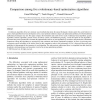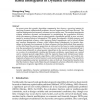639 search results - page 13 / 128 » Comparative analysis of genetic algorithm implementations |
83
Voted
GECCO
2007
Springer
15 years 6 months ago
2007
Springer
The Negative Slope Coefficient (nsc) is an empirical measure of problem hardness based on the analysis of offspring-fitness vs. parent-fitness scatterplots. The nsc has been teste...
117
click to vote
ECCV
2008
Springer
16 years 4 months ago
2008
Springer
The Random Sample Consensus (RANSAC) algorithm is a popular tool for robust estimation problems in computer vision, primarily due to its ability to tolerate a tremendous fraction o...
103
click to vote
AEI
2005
15 years 2 months ago
2005
Evolutionary algorithms (EAs) are stochastic search methods that mimic the natural biological evolution and/or the social behavior of species. Such algorithms have been developed ...
167
click to vote
EC
2008
15 years 2 months ago
2008
In recent years the genetic algorithm community has shown a growing interest in studying dynamic optimization problems. Several approaches have been devised. The random immigrants...
147
Voted
WOB
2004
15 years 3 months ago
2004
Several advanced techniques have been proposed for data clustering and many of them have been applied to gene expression data, with partial success. The high dimensionality and the...



